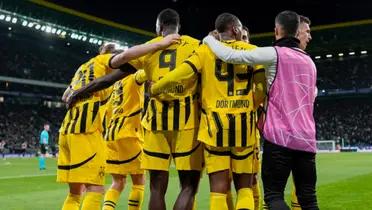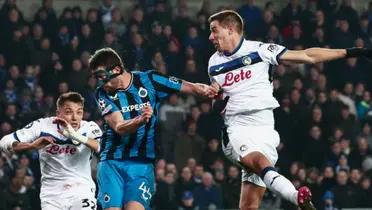WATCH | Unbelievable Twist: Brugge's Own Goal Hands City Champions League Lifeline
In the 62nd minute, a miraculous move occurred for Manchester City

In the 62nd minute, a miraculous move occurred for Manchester City, as the Ecuadorian Ordóñez scored an own goal to make the score 2-1. The Citizens are now qualifying for the Champions League play-offs thanks to the victory over Club Brugge at the Etihad Stadium in the last match of the league phase of the championship.
How Manchester City Avoided Champions League Group Stage Elimination Since 2012 Under Roberto Mancini
Manchester City’s journey in the UEFA Champions League has been one filled with highs and lows. However, one significant milestone in the club’s history came during the 2011-2012 season, when they made their debut in Europe’s premier club competition under the guidance of Roberto Mancini. That campaign marked the beginning of a transformation for the club, from being an underdog in European football to becoming a force to be reckoned with. Though the 2012 season ended in heartbreak for City as they were eliminated in the group stage, the club has not found itself in a similar predicament ever since.
Looking back at their 2011-2012 Champions League campaign, Manchester City’s experience in the competition was a rude awakening. Despite finishing third in the Premier League in the previous season and securing a coveted spot in the Champions League, City found themselves in a tough group alongside Bayern Munich, Napoli, and Villarreal. Mancini’s men struggled to cope with the demands of European competition, failing to make it past the group stage. The team earned just 10 points in six matches, which, while respectable, wasn't enough to secure qualification to the knockout rounds. The defeat to Napoli, in particular, stood out as a costly setback, leaving the team with no chance of advancing.
However, the experience was not in vain. It served as a catalyst for improvement in subsequent seasons. While Mancini was criticized for his inability to guide the team through the group stages, the Italian manager's tactical philosophy laid the groundwork for future success. His emphasis on solid defensive organization, counter-attacking play, and the integration of key players like Yaya Touré, David Silva, and Sergio Agüero would set the stage for City’s transformation into a European powerhouse.
After the 2012 setback, City’s fortunes in the Champions League began to improve, and much of that improvement can be attributed to a shift in managerial strategy and squad development. Following Mancini’s departure in 2013, Manuel Pellegrini took over the reins, bringing a more attacking and fluid style of play to the team. Under Pellegrini, City progressed through the group stages of the Champions League with greater ease, notably reaching the semifinals in 2016. The team’s ability to advance past the group stages without much difficulty became a regular feature of City’s European campaigns.
Pep Guardiola’s arrival in 2016 further solidified Manchester City’s place as a perennial contender in the Champions League. Guardiola, known for his tactical brilliance and attacking-minded football, revolutionized the team’s approach. With the likes of Kevin De Bruyne, Raheem Sterling, and Bernardo Silva, City’s attacking prowess became almost unstoppable. Under Guardiola, City consistently topped their Champions League groups, advancing to the knockout stages with relative ease. Notably, they reached the final of the competition in 2021, marking their ascent to the very top of European football.
The key to Manchester City’s sustained success in the Champions League since 2012 has been their ability to adapt and evolve with each passing season. While Mancini’s squad fell short in 2012, it was the start of a learning curve that ultimately saw the club grow into one of the most formidable teams in Europe. Guardiola’s tactical approach, combined with City’s continued investment in world-class players, has made the club a mainstay in the knockout rounds of the competition.
Moreover, the club's organizational stability has also played a crucial role in ensuring consistent performances in Europe. Manchester City's hierarchy, including club owners and sporting directors, have provided Guardiola with the resources and support to build a squad capable of competing at the highest level. This stability has allowed the team to remain focused on their goals, overcoming obstacles and building on their European pedigree.
In conclusion, Manchester City’s remarkable transformation since their 2012 Champions League elimination is a testament to their growth as a club. The challenges faced under Roberto Mancini in that campaign served as a turning point, propelling City to improve both tactically and in terms of squad depth. Since then, under the guidance of different managers, including Pellegrini and Guardiola, the club has avoided a repeat of their group stage exit, establishing themselves as one of Europe’s elite. As they continue to pursue their Champions League dream, Manchester City’s resilience and commitment to improvement ensure that they will be a force in European football for years to come.
More news

Neymar's father drops bombshell revelation about Barcelona return
19/02/2025

What advanced training methods are used in the Premier League for physical preparation?
18/02/2025

How does psychology influence tactical decisions and match outcomes in the Premier League?
18/02/2025

How Do Tactical Changes Affect Premier League Match Outcomes and Team Performance?
18/02/2025

Who Is Alverca FC? The Portuguese club now owned by Vinícius Jr.
18/02/2025

Which are the oldest and most historic football stadiums in the Premier League?
18/02/2025

What are common tactics used in the Premier League and how are they countered?
18/02/2025

When is the Aston Villa vs Liverpool match and how to watch it? Premier League broadcast
18/02/2025

Deja Vu at Atletico? Simeone's Julian Alvarez decisions mirror Guardiola's moves
18/02/2025

Julian Alvarez's Manchester City exit: Pep Guardiola's full explanation
18/02/2025

Thibaut Courtois's goalkeeper snub: Dibu Martinez left out in the cold
18/02/2025

From NBA to Europe? The latest rumours surrounding Kevin Durant's future
18/02/2025

When is the Bayern Munich vs Celtic FC match and how to watch it? Champions League broadcast
18/02/2025

(VIDEO) Social media explodes after Ciro Messi's wonder strike
18/02/2025

Why are fan incidents a problem in the Premier League and what's being done?
18/02/2025

What steps did Omar Marmoush take to rise from Egyptian football to become a Premier League star?
17/02/2025

Who are the most influential Premier League captains in 2024-25?
17/02/2025

What makes a good manager so important in the Premier League?
17/02/2025



